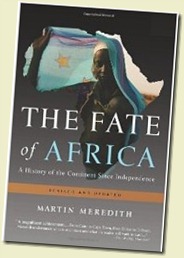Link to part 1 of this series.
Link to part 2 of this series.
As part of preparing for my work in Africa, I read Martin Meredith’s compelling book The  Fate of Africa: A history of the continent since independence. I won’t sugar coat it…this comprehensive 900 page book is a veritable Greek tragedy of truly epic proportion. In fact, it’s so sad that I wish I could burn it in the incinerator at the local hospital near my location in Africa, but I can’t. More on that later.
Fate of Africa: A history of the continent since independence. I won’t sugar coat it…this comprehensive 900 page book is a veritable Greek tragedy of truly epic proportion. In fact, it’s so sad that I wish I could burn it in the incinerator at the local hospital near my location in Africa, but I can’t. More on that later.
There is a simplistic view, often taught and espoused without much critical thought, that European powers pillaged Africa for its riches and left when it became untenable for them to continue. It is no doubt true that there was widespread exploitation and some unbelievable cruelty – particularly by the Belgians in central Africa. However, one cannot use that as an excuse for why the GDP of most African nations is now so much lower than at independence, especially given the vast resources on the continent – many of which were unknown or not even desirable during the colonial period. Nations that were formerly self-sufficient in certain food stuffs or other goods, or even net exporters, are now mired in kleptocracy and utterly dependent on foreign aid to survive.
I was discussing this book with our native African interpreter. He has a degree in African history and is a very educated guy who studied in the US and Canada and lived abroad for many years. He had had a little to drink when we were talking. He said the first time he read this book he found himself literally crying many times. “And you have to understand,” he said, “it is not normal that a man in my country cries.” His face and the tremor in his voice spoke volumes of the frustration he feels.
There are so many instances I’d like to share from the book, but I’ll limit myself to just a few. If forced to select a single emblematic poster child for how screwed up Africa is, I’d have to pick Mobutu Sese Seko of Zaire the Democratic Republic of the Congo (wait, not that Congo, the other Congo).
“The steel mill at Maluku, near Kinshasa, constructed at a cost of $250 million, was designed for a capacity of 250,000 tons per year, four times Zaire’s requirements. After opening in 1975, production reached a peak of 25,000 tons a year; after 1978 it never exceeded 10,000 tons a year. The mill produced only low-grade steel at eight times the cost of better-quality imported steel.” (Chapter 17)
After 10 years of independence, hospitals lacked supplies and medicine, the transportation system was a wreck – even by African standards, and employment was lower than at independence. Those who had jobs found their wages eroded by rampant inflation. Only 1 per cent of the land was cultivated.
 Given the level of theft at the presidential level, it was generally believed that Mobutu had squirreled away hundreds of millions of dollars. “But at the end of it all, after Mobutu’s downfall…a paltry $4 million was discovered in Swiss banks.” (End notes for chapter 17.) In short, he stole much and he spent basically all of it, and left his country a shell of what it had been so many years before. Just dilapidated public works and ridiculous palaces.
Given the level of theft at the presidential level, it was generally believed that Mobutu had squirreled away hundreds of millions of dollars. “But at the end of it all, after Mobutu’s downfall…a paltry $4 million was discovered in Swiss banks.” (End notes for chapter 17.) In short, he stole much and he spent basically all of it, and left his country a shell of what it had been so many years before. Just dilapidated public works and ridiculous palaces.
But Mobutu was by no means alone. In Mali, government control of food production was, unsurprisingly, a disaster. In 1981, farmers were being paid 63 francs for a kilo of rice it cost them 80 francs to grow. “Farmers were frequently paid months in arrears; crops were not collected on time; fertilisers, seeds and pesticides were delivered late; shortages led to corruption and favouritism.” (Chapter 16)
There is a historic tribal and clan association with communal egalitarianism in Africa – as in many tribal or clan based societies. In the post-colonial era, this collective (pun intended) memory was exploited by both the well-meaning and the tyrants in nearly every African nation giving rise to an interesting ideology called “African Socialism”. Really, the only difference between African and classical socialism is this attempt to associate traditional African lifestyle patterns as a veneer over plain ol’ socialism. As Meredith states in chapter 8, “Yet despite all the time and energy spent on explaining it, African socialism was little more than a potpourri of vague and romantic ideas lacking all coherence and subject to varying interpretations.”
As Julius Nyerere, first president of Tanzania, said, “We in Africa have no need of being ‘converted’ to socialism than we have of being ‘taught’ democracy. Both are rooted in our past in the traditional society which produced us.”
In similar vein, Kwame Nkrumah advocated a centrally planned move from agricultural to industrial economies, “The circle of poverty can only be broken by a massively planned industrial undertaking.”
In an essay written in 1962, he gave glowing praise to the supposedly socialist and collective roots of pre-colonial African society, but let us just say that his research and recollection was somewhat generous in this praise, to say the least.
So why can’t I burn the book? Well, when we visited the hospital, quite a large on by African standards, we asked why there was so much medical waste on the grounds. Why didn’t they burn it? Ah. They couldn’t, they explained. It seems their incinerator was choked with ash. “Interesting, yes we see that,” I said. Why don’t they empty the ashes? It appears that while the groundskeeper is paid by the Ministry of Health to put stuff in the incinerator and to light the fire, it is not his job to empty it. In fact, it seems that is no one’s job. And no one is right on top of it. Our Major said, “Do you have a bucket and a broom? Maybe you could empty it right now.” Oh no, that would not be possible. It is no one’s job to do that.
Since that time, I’ve discovered in our files that the US paid to demolish the old incinerators and build new ones in 2007. It seems the old ones were full of ash that was so thickly caked on that it could not be removed.
Clearly, the Africans learned at least some lessons in bureaucracy from their former European masters. They have many more reasons why they should NOT do something than why they SHOULD. A lot like France.
 Of course, one of the profound challenges facing Africa is AIDS. Most westerners really cannot conceive of the widespread effect of AIDS on modern Africa. It has taken a massive toll, not only in terms of the financial impact of treating and managing the disease, but also in terms of the incalculable cost in human and intellectual capital of the victims and the diversion of resources from other aspects of development. In the course of discussing the impact of AIDS in Fate of Africa, Meredith references another book which explores a controversial theory concerning the origin of AIDS - The River by Edward Hooper.
Of course, one of the profound challenges facing Africa is AIDS. Most westerners really cannot conceive of the widespread effect of AIDS on modern Africa. It has taken a massive toll, not only in terms of the financial impact of treating and managing the disease, but also in terms of the incalculable cost in human and intellectual capital of the victims and the diversion of resources from other aspects of development. In the course of discussing the impact of AIDS in Fate of Africa, Meredith references another book which explores a controversial theory concerning the origin of AIDS - The River by Edward Hooper.
Some years ago, a good friend mentioned an interesting book she was reading about a theory on the origin on AIDS – this same one. While The River seems to be out of print and is not available as an eBook either, I was very happy when my friend managed to dig the hardback out of her storage unit. Like Fate of Africa, this is a near 1000 page behemoth. I devoured it as soon as I finished Fate of Africa and was not disappointed.
I mentioned this is a controversial theory – namely that there was an inadvertent introduction of what was previously a simian virus (SIV) into humans through the testing of an oral polio vaccine in central Africa in the late 50’s – on the eve of independence. Even the author, despite what appears to be careful research, admits the case is largely circumstantial and leaves the door open to being disproven on the facts. Regardless of whether this is indeed the origin of AIDS, the book unfolds a sad tale of scientific neocolonialism. The notion that, for whatever reason, Africa was a ripe ground for western scientists to test vaccines and other treatments and procedures that would not be allowed in their own countries. Often, they did these tests deliberately excluding the white population of the areas covered by their testing.
Whether you are looking at the Scramble for Africa that set of the European colonial period in earnest, wide open medical testing in the 1950s and 60s, or the Chinese exploitation that is currently going on across the continent, it seems that Africa cannot catch a break. You don’t need to be African to feel a little weepy over that.